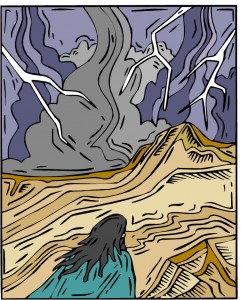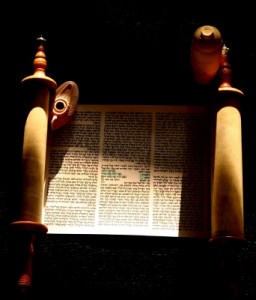A Study on Exodus 19—Are You Ready for Pentecost?
On Shavuot or Pentecost, YHVH gave his people Israel the Torah at Mount Sinai. But before they could see his glorious manifest presence, hear his voice, and receive his Word, they had to prepare themselves to meet him. Are you preparing yourself to meet YHVH this coming Sunday—on Pentecost?
An invitation.  In this chapter, YHVH invites his people to come near to him, to receive his Torah, and to enter into a spiritual relationship with him. He had just delivered them from their sins, suffering and bondage when he led them out of Egypt (v. 4). He now offered them enticing blessings and status among the nations of the world (v. 6) if, and only if, his people would agree to his terms and conditions (v. 5).
In this chapter, YHVH invites his people to come near to him, to receive his Torah, and to enter into a spiritual relationship with him. He had just delivered them from their sins, suffering and bondage when he led them out of Egypt (v. 4). He now offered them enticing blessings and status among the nations of the world (v. 6) if, and only if, his people would agree to his terms and conditions (v. 5).
But he would not allow his people to accept his benefits on their terms, but only on his terms. This is where men and religious systems have missed it: they want to accept YHVH on their own terms, not YHVH’s terms. Such is the religion of humanism—that man knows better than YHVH what is good for him, which is the religion the serpent pawned off on the first man and woman at the tree of knowledge. The problem is that accepting YHVH on our terms is called sin, which leads to misery and eventually to eternal death!
There are preconditions to meeting with YHVH and coming into relationship with him—coming to his high and holy mountain, his place of abiding, and his presence. Coming to this place is not without cost. David talks about who can come to the mountain of YHVH in Psalms 15 and 24. Only those who have clean hands and pure heart and who abstain from sin.
YHVH told the children of Israel that they could approach him and become his special people if they would meet certain conditions, and only then would he bless them (v. 5–6).
Even after the people had agreed with his terms (v. 8), after they had accepted him as their Savior when they put the blood of the lamb on the door posts of their homes resulting in the judgments of YHVH passing over them (Exod 12), YHVH’s blessings could come only after they had met certain requirements. Salvation is based on faith and grace alone, but rewards and blessings come based on obedience to the commandments of Elohim (Matt 5:19). To receive YHVH’s blessing, the Israelites had to consecrate themselves to him (vv. 10,14). This involved putting away the filth of the world (symbolized by washing their clothes) along with men’s carnal passions (symbolized by abstaining from sexual relations with their wives, vv. 10, 14–15). Graciously, YHVH gave them two days to accomplish this (v. 10). They had to get ready to meet YHVH (v. 11). One can’t expect simply to waltz into the presence of the Mighty King of the Universe in a casual and haphazardly manner!
YHVH had additional protocols that the people had to follow to come into his presence. Boundary stones were set up at the base of the mountain (v. 12). A death penalty came upon any who crossed those boundaries and came presumptuously into the presence of the Creator of the Universe (vv. 13, 22, 24). Moreover, before they could come into the presence of the Almighty, the fear of YHVH had to be established in the hearts of the people—something that is entirely lacking among most people in our generation including those in the church!
It was then and only then after the Israelites had agreed to meet YHVH’s terms and conditions, after having consecrated themselves for two days prior, and then set up boundary stones at the base of the mountain that the fire and glory of YHVH fell upon the mountain for all the people to see. It was then that YHVH hand delivered to his chosen and consecrated people his precious instructions in righteousness—the Torah.





